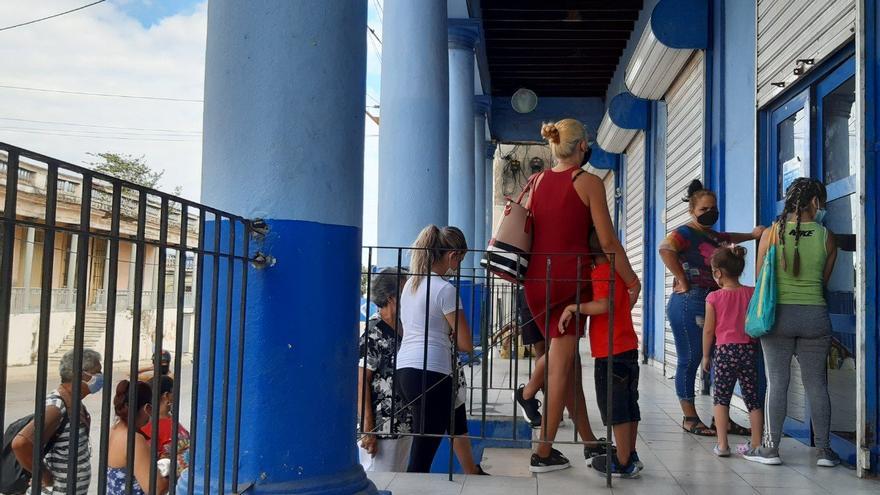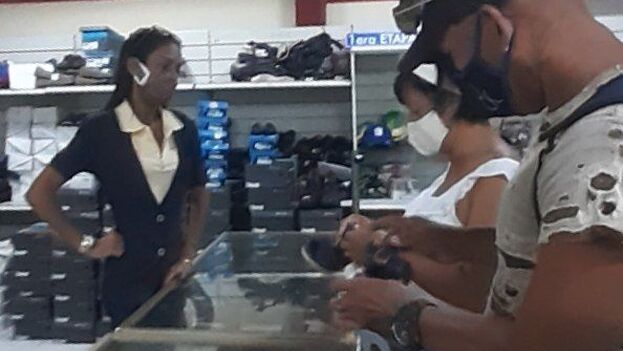
![]() 14ymedio, Natalia López Moya, Havana, November 4, 2021 — Manuel is waiting in line outside El Peñon because he is looking for shoes for his daughter, who starts school on November 15. The store, located on Calzado del Cerro, is part of the state-owned Caribe retail chain and sells damaged or defective merchandise.
14ymedio, Natalia López Moya, Havana, November 4, 2021 — Manuel is waiting in line outside El Peñon because he is looking for shoes for his daughter, who starts school on November 15. The store, located on Calzado del Cerro, is part of the state-owned Caribe retail chain and sells damaged or defective merchandise.
“I understand what you’re all saying but children are not allowed inside,” says an employee who has come outside to explain store policy. Protests break out from many of the parents in line. Just as some are about push their way inside with their little ones, the matter is resolved when, at the request of one mother, the manager gives the green light and allows children inside.
A year and a half into the country’s ever-worsening, perennial economic crisis, footwear remains one of the Cuban public’s most essential luxuries. Shoes can be found at stores selling goods for foreign currency, which most people do not have, or at privately owned businesses, where prices are also very high.

In fact, Manuel had spent the morning looking at the wide variety of footwear in the display windows of the Plaza de Carlos III retail mall. But with no relatives living abroad, shopping there is an impossibility. For Cubans like him, divided into social classes based on the kind of currency they have, places like this have become symbols of a new kind of apartheid.
Having finally managed to get inside El Peñon, Manuel heads straight to the footwear section, the busiest place in the store. “Yeni, you’re not going to believe this! I found shoes for her,” a sweaty Manuel shouts into his phone. But no sooner has he hung up than he looks at the other customers and senses something is not quite right.
“Of course, they’re all detached or defective, mi amor. Why do you think they’re so cheap?” replies a saleswoman to one mother.
“Are they even worth 192 pesos?” thinks Manuel, suddenly feeling clammy.
“Mommy, I don’t want to go to school with broken shoes. My friends will make fun of me,” says the little girl. Her mother tries to calm her fears.
“Your father will take them to have them fixed and they’ll be as good as new,” she tells the sobbing child as she and her father go downstairs to pay for the shoes.
Manuel thinks the search for shoes for his daughter was over when the sales clerk cheerfully hands him the size he was looking for. But when he opens the box and sees the soles almost completely detached from the shoes, his spirits sink to the floor.
“I don’t think I can bring myself to take these home. I appreciate the service here but I find it highly insulting and inconsiderate that, at this point, I’m not able to be find decent shoes for my daughter, who I have to send to school in little more than a week,” he says calmly, with an air of powerlessness, as he slowly returns the shoes.
The situation is much the same in the rest of the store. “Have all the leaders of this country gone crazy?” asks Miguel of another customer browsing there. “An electric coffee maker that doesn’t work and is missing parts for 1,000 pesos. A broken washing machine with no motor for more than 6,000. A burnt-out flat-screen TV with a shattered screen for 3,000 pesos. This is too much!” Meanwhile, another customer is looking at clothes advertised as second-hand but which look much more like fifth-hand.
Manuel leaves the store. His steps home feel heavy. His 10-year-old daughter is waiting there for him, excited about her new shoes. “I give up. This is impossible!” he yells to her mother before explaining what happened. A curious neighbor, who overhears the conversation from another apartment in the building where they live, leans out to tell him that he has some shoe glue he could use to put them back together.
After thanking the helpful neighbor, Manuel quickly returns to the store, ready to tell the clerk he has changed his mind and now wants the dilapidated shoes. But it has already closed. “Three in the afternoon and the store is closed to the public without any explanation,” he says. “I’ll come back tomorrow. Just another day in paradise.”
____________
COLLABORATE WITH OUR WORK: The 14ymedio team is committed to practicing serious journalism that reflects Cuba’s reality in all its depth. Thank you for joining us on this long journey. We invite you to continue supporting us by becoming a member of 14ymedio now. Together we can continue transforming journalism in Cuba.
